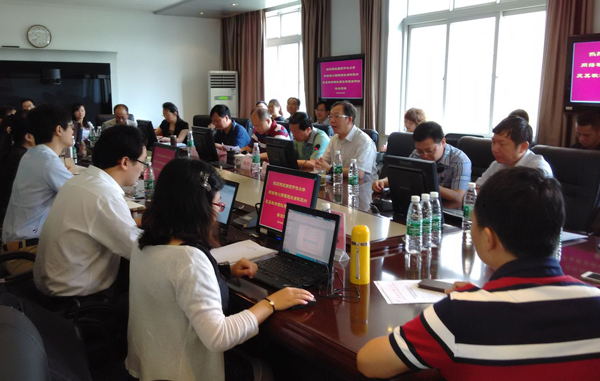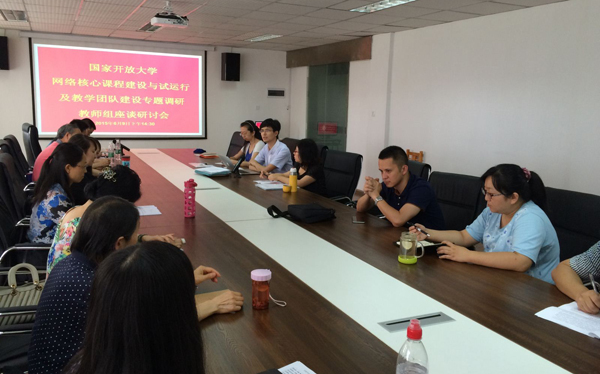 In order to know the status of the organization of teaching at branches participating in the new learning website and the online courses pilot programme of the Open University of China (OUC), to discuss issues related to mobile phone trial programme, and to exchange views on and discuss measures to promote online teaching, from June 8th to 12th, 2015, the OUC Learner Support Centre visited the OUC Chengdu Branch to carry out a special investigation.
In order to know the status of the organization of teaching at branches participating in the new learning website and the online courses pilot programme of the Open University of China (OUC), to discuss issues related to mobile phone trial programme, and to exchange views on and discuss measures to promote online teaching, from June 8th to 12th, 2015, the OUC Learner Support Centre visited the OUC Chengdu Branch to carry out a special investigation.
In recent years, the OUC Chengdu Branch has made significant progress in online teaching work with continued outstanding results. In the fall of 2014, it began to participate in the new learning website and online courses pilot programme and has made an important contribution to the practice and exploration of the OUC's "Integration of Six Networks" reforms.
Deputy Directors Cheng Gang and Qi Wenxin of the OUC Learner Support Centre led a 6-Member group to participate in this research.
On the first day of the research, Chengdu Branch organized a symposium. Mr. Zhao Gang, Party Secretary, Zhou Jiping, President, Deputy Party Secretary Miao Peibin, and Li Yi, as well as personnel from the Academic Affairs Department, Teaching Divisions, and organizations directly under the Chengdu Branch attended the symposium. In addition, Chengdu Branch also organized seminars for school running organizations, teachers’ and students’ panel discussion, and pilot working group professional panels to carry out studies and discussions with the research group of the OUC over online teaching, experiences of trial operations, reform proposals, and implementation approaches. The research group learned that the Chengdu Branch has explored a lot of good practices worthy to be imitated and promoted in advancing e-learning, implementation of the teaching process, and enhancing the quality of teaching as follows:
First, the online teaching and examination reform linkage mechanism: For the 144 courses opened in the provincial Radio and TV University (RTVU), online examination reform was promoted. The curriculum grades consisted of 40% regular grades, 40% online examination scores, and 20% ratings from school running organizations, which fully engaged the students' enthusiasm for online learning. Participation in online activities also had a positive effect, encouraging students from the ground up.
Second, to open and supervise the online learning process: The goal is to fully utilize data gained via the new platform to openly rank new threads in the forum, new curriculum resources ranking, student learning time, and teachers’ posts ranking, and so on. There is also an initiative to set up an internet teaching observer post to observe and supervise all kinds of online teaching in order to offer positive commendation and make suggestions for improvements. According to data analysis and observer’s feedback, specific improvement measures were taken for different types of courses.
Third, the teaching model of online and offline mutual promotion: Exploration was made into the linkage of classroom instruction with online discussions, the linkage of real teams and virtual teams, and effective integration of offline teaching activities with the online follow-up, feedback, and communication, which has enhanced the students ' willingness to participate, thus enriching the learning experience.
Fourth, the organizational management structure of online learning guide activities: A three-level online learning guide organization and management structure comprised of Academic Affairs Office, Teaching Divisions, and School Running Organizations with clearly set tasks was established. The Academic Affairs Office is responsible for coordination, innovation, instruction, promotion, and result evaluation. The Teaching Division is responsible for theme design of the learning guide, monthly planning, and implementation. The School Running Organization is responsible for organizing student participation as well as participation follow-up and feedback. Based on the results, learning guide activities were well planned with clear themes and the student exchanges turned from passive to active, which turned out to be very effective.
Fifth, normalizing the online teaching workload and teaching innovation awards. Teachers’ online posts and activity organization were included in the teaching workload, and awards for online teaching organization, outstanding class teacher, and student online stars were set up, stimulating enthusiasm on the part of both teachers and students.
At the seminar, Chengdu Branch, based on the difficulties and problems encountered in the teaching reform and the online courses pilot programme, proposed three suggestions: 1. To standardize course construction: Courses should be designed as per a unified specification and standard, with a unified page design and rendering form; 2. To further perfect the functions of the new platform: Management monitoring and data statistics and analysis functions can be used to guarantee that school running units and management personnel will have the ability to check the status of students' online learning, assignment completion, and the teachers' online tutoring and homework review on a real-time basis; 3. To allow students to independently select courses on the platform or delegate the course selection right down to the grass-roots level: This will shorten the time of course selection, reduce data errors caused by trivial details, and avoid students' delayed entry into the learning network and ending up lagging behind the class.
The staff from the OUC’s Learner Support Centre said they would fully absorb the experience of this research, accelerate relevant online teaching reform and online teaching team building.
In addition, the teachers of the OUC’s headquarters held specialized training for teachers in regards to course construction, application, and teaching on the Moodle platform.
 Report on the Work of the Pilot Programme by Chengdu Branch
Report on the Work of the Pilot Programme by Chengdu Branch
 Teachers Panel Discussion
Teachers Panel Discussion
 Students Panel Discussion
Students Panel Discussion
 Teachers Training Site
Teachers Training Site
By Cheng Gang, OUC